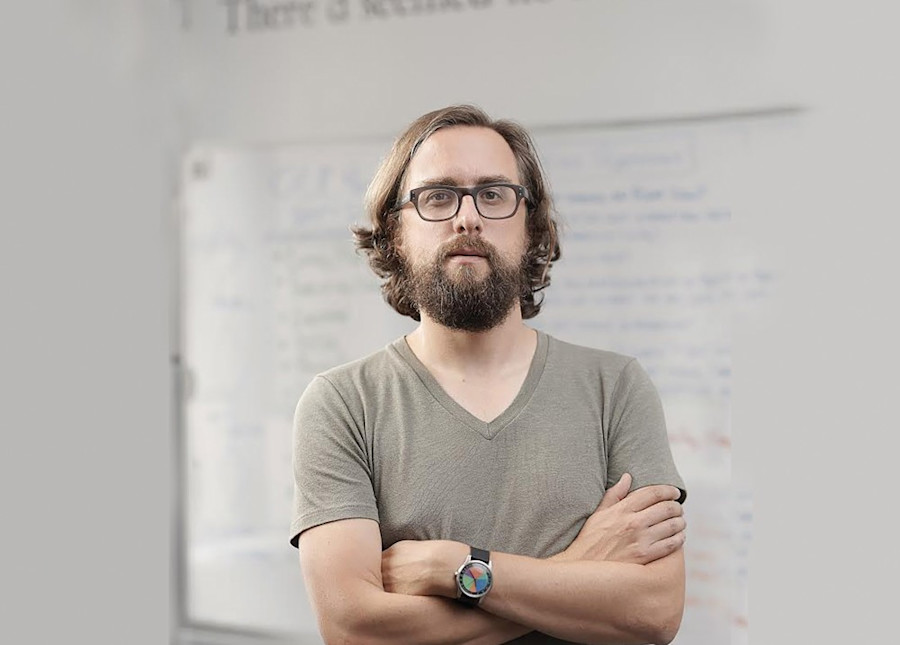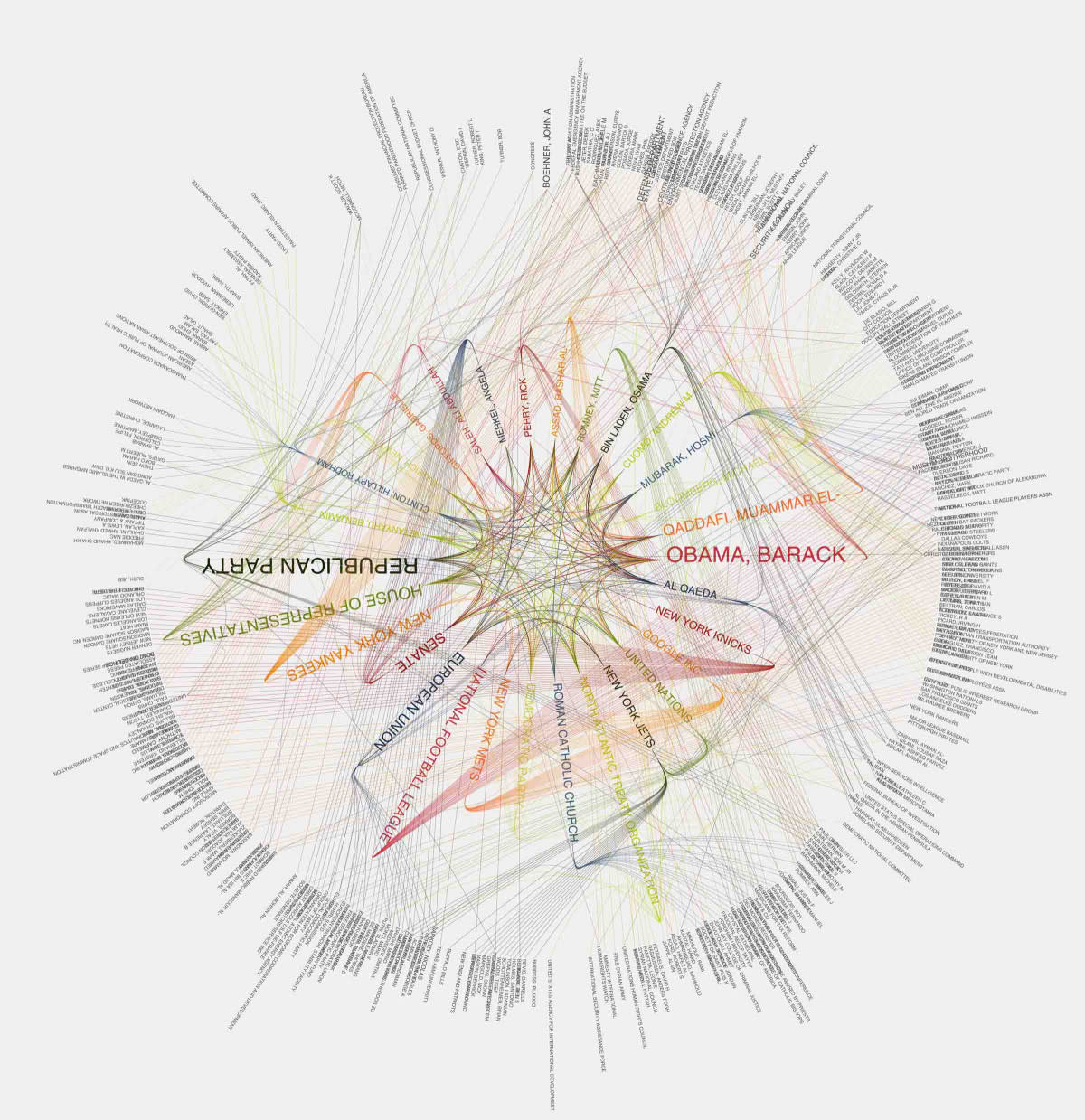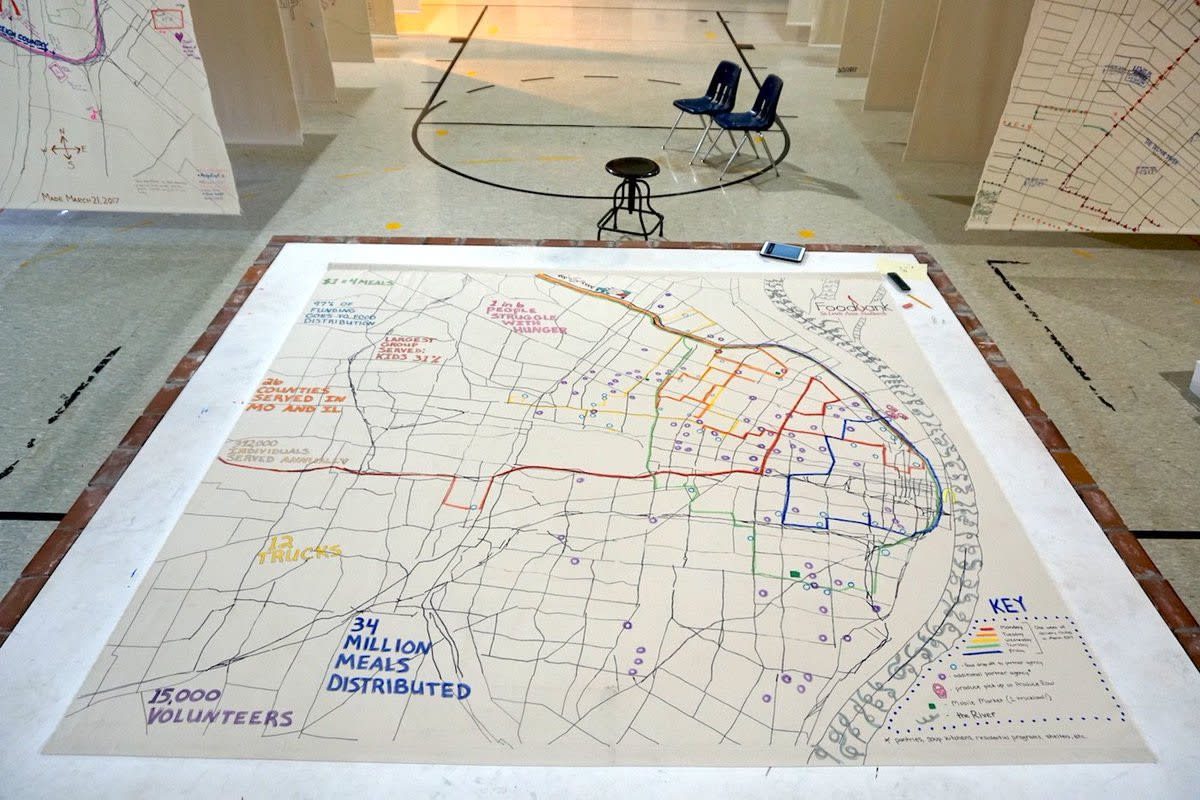An Interview with Jer Thorp

A Canadian data artist
Where are you?
I’m in a Washington, DC hotel room. I’m doing a residency at the Library of Congress, so I’ve been in the library all day. Normally, I’m in Brooklyn.
I imagine you’re busy at the moment?
I’m going on a National Geographic expedition into Angola soon, so I’m arranging to see some maps tomorrow, to make sure that they were ready to scan. It’s a conservation project I’ve been working on for five years now, that’s centred around a river system. I was there in 2015 doing some work, and now we’re going back to this relatively untouched region.
Sounds amazing. Patagonia springs to mind. I did hear the founder (Yvon Chouinard) buy’s land across Patagonia to ensure local communities have access to it, and restricts over-development from the government or private companies. Is that in any way similar to what you are doing?
This isn’t so much about buying land, it’s about working with the government to try to keep it with the local communities.
Tell us a few things that you have discovered through your work in data visualisation.
The process of discovery has really been about widening my ideas of what data is and what I can do with it. When I started working with data in 2008, I was mostly interested in the magic trick of visualisation. The idea that you can take numbers from a spreadsheet or an API, and you can tell a story with them was interesting in itself. My background is in software-based art and generative art, so I feel like I had the tools to do that.
What I found over the years, though, was that beyond that immediate personal reward, I felt like I wasn’t really getting to the heart of what the data was representing.
For example, in the Angola project, I designed all the data systems that we used around the expedition to collect the data, designing the system that stored and processed the data, and the front end that allowed people to explore it. I like the holistic approach to data. That philosophically is a most amazing journey for me, and a realization that data is firmly embedded in our local lives, in the way that we exist.
When I looked back through your work, beyond creating great visual elements and seeing the data, there was a moment when you connected the dots between this and giving it human context.
Definitely. That’s the underlying thing that’s driven my work. I gave a TED talk in 2009 which is about making data more human, and I see that moment as the beginning of what I’ve focused on, which started with the Office of Creative Research, which is the studio I ran for six years. We would do data performances, data sculpture and create interactive tools which would empower people to understand their own data, and have voice in the conversation about data.

How do you feel about Artificial Intelligence?
This is something I think about a lot. I served on a World Economic Forum panel for a little over a year about AI, machine learning and the future of trust, and there is something really profound happening right now. I personally have issues around the term ‘Artificial Intelligence’. I certainly don’t think it’s work getting pedantic about AI, but if we think about machine learning and what’s happening with the large scales of data being combined new methods of classification and processing, there are a lot of things happening that we didn’t think possible two or three years ago. And these are already having huge effects on us. Just look at what’s happening with Facebook and Cambridge Analytica. One thing that is being overlooked with them is their clients; a lot of whom are in the global south, in countries with questionable governments. So their work is being deployed not in the US or UK, but in places that can’t manage the effects.
I share your thoughts on this. The thing that concerns me is the lack of responsibility for the advancements of these technologies at such a fast pace and all without much consideration for the ramifications and social effects. Have you thought much about predictive graphics? You’re capturing data in such a beautiful way, but it represents everything up until that exact moment. How do you think about taking that forward into the future?
Going backward is phenomenally easier than going forwards. And the fact is prediction is only going to work to a certain extent, and we know this. One of the great scientific achievements of the 20th century was Chaos Theory, which tells us that with complex systems, there’s only so far we can see into the future before it gets so chaotic that we don’t really know what’s going to happen.
It’s the reason why we only get 10-day weather forecast. We can’t solve that at the moment but we’re throwing a lot of computation at it. I’m wary of prediction, and in a lot of ways, it doesn’t really interest me, because I don’t think that prediction will ever really tell us anything definitive. It can also be dangerous if things we predict don’t happen. We don’t have to look much further than this country’s recent election to see what that means. I’m much more interested in looking at how we can give the tools to communities and individuals to help them understand their current condition.
“I certainly don’t think it’s work getting pedantic about AI, but if we think about machine learning and what’s happening with the large scales of data being combined new methods of classification and processing, there are a lot of things happening that we didn’t think possible two or three years ago.”
Jer Thorp

I was listening to a podcast with Dennis Crowley (Founder of Foursquare) recently and he talked about how they predicted a downturn in business for Chipotle of 27%. So now you have business’ monetising this.
This is the beautiful thing about prediction; when you’re right, you brag about it. When you’re wrong, you can say ‘Oh, it’s the statistics.’ This is what happened with Nate Silver, right? Statisticians have the best of both worlds.
There’s a kind of fetishization of prediction that I find really disturbing, and this is easy to see in the financial world. And this played 14 a significant role in the financial collapse because we had trust in the system.
Then, what’s your role in all this? I’m a visual person, and this is where I can really connect with what you create, because it places something that is hard to understand into a digestible experience that I instantly get a sense of, or I can really dive deep into it. Do you feel a sense of responsibility?
Yeah, I feel a great sense of responsibility, and I feel a real complicity in the place we’ve found ourselves in, because I see other practitioners spending a great amount of time trumpeting data and not being critical enough.
My work, for almost entirely the last three to five years, has always involved people and has always been about, increasing individuals’ power in these discussions, and that came from realising my early work didn’t do much to stop our path towards where we’ve ended up.
I also really find a lot of delight in data than I previously did.

Is there a piece of technology that you’re waiting to be invented so that you can do your job better?
I was just having a conversation with a friend of mine Tahir Hemphill, who’s sitting next to me in the library, and he’s been doing a lot of work with VR and AR, and he’s kind of excited about those technologies. But myself, I’m focused on community as a technology in itself. I can’t imagine anything that will get my 42-year old self-excited. I was really fascinated with technology, but now I feel a grounding in the messy reality of the world.
Thinking about your career as a whole, what are the pros or the cons of working for companies, governments and our on your own?
I did freelance web-work from 1999 to 2005, and then left that intentionally. Then, when I started this company, we were very clear from the start that we would never do branding work, work for advertisers, or anyone that was selling something. I want to be very careful in saying that I’m not damning people for whom this is their career at all. I’m saying personally, this was the clear path for me.
I try to make the argument very clearly with my students that this is their choice to make. But I might suggest they push against the propaganda.

I think there is some big cultural shift with the next generation. People want to be a part of something bigger than just themselves, and they want to contribute, and they want positive change to really shape the world around them. You have a huge amount of experience working privately, with the government, for public institutions and then on your own company, and there is a lot to share there.
Yeah, I think that’s the only lesson that I really can tell people is that there is another path and that path is viable. You don’t have to work in Silicon Valley to have a great career that builds you a home to sleep at night and support your family.
I just got a Push Notification that Tesla is recalling 123,000 vehicles – Elon certainly has a unique way of running his companies. Is there a person or business that you feel would have a profound positive impact if they embraced data and it’s visualisation?
All of them! I’m writing a book about this subject right now. I think we need to rethink entirely the way that we think about data and reframe it in a way in which humans are at the centre of it. And in doing so, I think we do a better job, and we build better trust systems with the people that use our products, and also establishing a longer-term life for these things.
There’s a real central problem to the way that we’ve behaved in the last 10 years, in that it’s dependent on the customer not finding us out. And that’s not a good thing, right? If your business model depends on your customers not finding out what you’re doing, that’s bad, because they’re going to find out, and it’s going to have big problems for you. Most companies already embrace data visualisation. What I think they need to embrace is the human-centred data approach.
Last question. If there was an artist that you could somehow inherit the talents of, or that you could collaborate with, who would that be?
Oh, man, that’s a good question. I get a lot of my inspiration not necessarily from the visual arts, but from fiction. I’m going to go with Ursula Le Guin, who passed away this year, is one of my longtime favorite artists, and I feel like she really would’ve got the things that are happening.